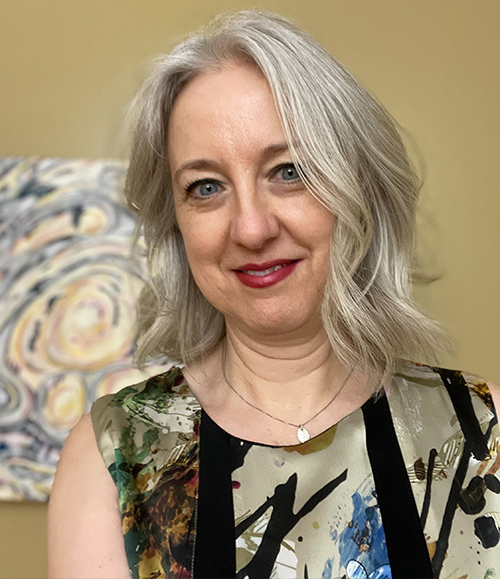High-skilled female migrants forgo professional aspirations and turn to home life after facing multiple barriers to their career advancement, MSU Sociology research finds
May 24, 2023 - Karessa Weir
Turkish women who migrate to the US for their husbands’ careers often find themselves unable to pursue their own professional ambitions and instead take on full-time care of children and homelife, according to new research by MSU Sociology Associate Professor Stephanie Nawyn.Even those who are highly educated and skilled face “overlapping systems of oppression that presented barriers to their career advancement and pushed them towards reproductive labour instead,” Nawyn published in her recent paper “The re-domestication of high-skilled immigrant women: modifying career ambitions post-migration” in the Journal of Ethnic and Migration Studies.
 Nawyn is co-director of MSU’s Center for Global in Global Context (GenCen).
Nawyn is co-director of MSU’s Center for Global in Global Context (GenCen).“Over time, a process of re-domestication unfolded as the women’s priorities and identities as career-focused individuals shifted as a way to adapt to the limitations on their career advancement resulting from structural and cultural barriers to succeeding in the US labour market as dependent migrants,” Nawyn wrote.
 Nawyn collaborated on this project with Seçil Paçaci Elitok (Oakland University). Elitok interviewed 18 highly educated Turkish women who migrated to the U.S. with their husbands to pursue a job or education opportunity for their spouse. She and Nawyn examined the women’s initial career ambitions, constraints for pursuing those ambitions and the decisions they made.
Nawyn collaborated on this project with Seçil Paçaci Elitok (Oakland University). Elitok interviewed 18 highly educated Turkish women who migrated to the U.S. with their husbands to pursue a job or education opportunity for their spouse. She and Nawyn examined the women’s initial career ambitions, constraints for pursuing those ambitions and the decisions they made. Often called “expat spouses” or “trailing spouses,” the women often have equal or higher earning potential compared to their husbands but after migration, they see “a depressing effect on women’s earnings that is similar to childbirth.” They face barriers such as visa status, a lack of professional networks, and patriarchal cultural norms that prioritize men’s careers, Nawyn found.
Those obstacles impact the choices women can make and changes to overall trajectories of their lives.
“Over time, their choices lead to re-domestication, in which women prioritize their family’s well-being and define the goals of migration in terms of the benefits afforded to their children and their marriage,” Nawyn wrote.
The women the researchers interviewed all earned degrees ranging from B.A., and M.A., to MD and PhD. Most had worked in Turkey prior to migration and the others had stopped working for the birth of a child. Before migration, most of them expected they would also benefit professionally from the move either by learning or improving English or gaining new knowledge and skills. All of them expected to find a job in the U.S. but ran into visa difficulties. In some cases, the women worked for free to create a professional network. But even when they could legally work, they ran into other problems such as U.S. employers not recognizing their training or certification done in Turkey. When they did find work, it was well below their skills and experience.
Zekiye, 43, was an architect in Turkey but her degree was not valid in the U.S. so she could not work as an architect, only as a technical staff to an architect. Sadriye was an engineer in Turkey but she ended up working at an IT help desk at a local college. Mahidevran was a medical doctor who wasn’t able to practice medicine - “hence, I put the working aspect of my life aside,” she said.
Childbirth usually meant that the women had full parenting responsibilities as well as all the household chores with little outside help or assistance from the husbands, leaving them little time to pursue a career.
Elitok herself migrated to Michigan when her husband was transferred there by his employer. She left her research position at one of the most prestigious research universities in Turkey, and was unable to find a comparable position in the US. She eventually acquired a part-time position at Oakland University, but she decided to put more of her time and energy into caring for their two children.
Sadly, Elitok became ill and passed away in April 2022. But Nawyn believes her legacy lives on both in her children and the research she produced in their paper.
“Seçil was a dedicated wife and mother, and also an accomplished scholar. Her full potential was cut short by her untimely death, but also immigration policies that delayed her ability to enter the labor market and other cultural and institutional barriers that pushed her and other women like her into the domestic sphere.”
Their research indicates that what might look like a choice to shift priorities from career to family is heavily influenced by the barriers the women faced pursuing their professional ambitions in the US. These barriers could be mitigated by providing public support for childcare, a more equitable division of household labor between wives and husbands, and enacting visa policies that better integrate all adult family members into the labor market.

